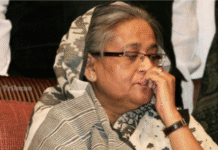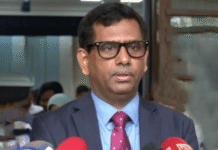Bangladesh has been seeking to import rice from other countries to meet domestic demands, but now prices in the international have started to soar. There are all signs of a big crisis in the global rice market, according to international agencies.
Sri Lanka had been trying to procure rice from the international market prior to Bangladesh and now the Philippines has joined the search too. China, which produces the most rice, has seen a slump in production this year. The UN Food and Agriculture Organisation (FAO) says if this country, self-sufficient in food, begins to import rice from the global market, there is all likelihood that rice prices will go up further.
Within Bangladesh, rice prices are at an all-time high. The rice procurement drive has been a failure so far. Rice in government stock is at the lowest and no time soon will rice be imported from the international market. Bangladesh is at a loss in face of this crisis.
According to the food ministry reports, this week coarse rice sold in Dhaka’s markets at Tk 45 to 48 per kg. The Trading Corporation of Bangladesh (TCB) says that over the past one year, rice prices in the country have gone up 42 per cent. Mid and fine grain rice sells between Tk 48 to Tk 56 per kg.
Bangladesh Institute of Development Studies (BIDS) Emeritus fellow M Asaduzzaman told Prothom Alo that in keeping with production and supply within the country, there is no way that the price of rice should be Tk 48. Traders are well aware that given their depleted stock, the government cannot intervene in the market. The government also has no idea how much the rice mills and traders have in stock.
The Bangladesh government has signed an MOU to purchase 1 million tonnes of rice from Vietnam. Over the last month Vietnam raised its rice price by Tk 1120 or US$ 12 per tonnes. The food ministry is looking expressed interest in importing 700 thousand tonnes of rice from India and Thailand. These two countries too have raised their rice prices over the past month by US$ 8 and US$ 13 per tonne respectively.
M Asaduzzaman, an expert in the field, blames the food ministry and minister for this predicament. He points out that the government’s rice stock has fallen below 200 thousand tonnes, whereas it should be 600 thousand tonnes at least. The moment the stock fell below 500 thousand tonnes, the minister should have taken initiative to replenish the stock. Such irresponsible behavoiur over a politically sensitive matter as rice would have cost the job of the food minister in India or the UK.
Former director general of BIDS Kazi Shahabuddin told Prothom Alo that rice prices in the international market are going up. The government should immediately import price before the prices escalate further. Opportunity must be given to private sector rice import by cutting import duty. If not, a crisis will emerge and the prices will be even steeper.
Director general of the food directorate Badrul Hasan told Prothom Alo, “There are laws to take action against the rice mills which refuse to give the government grain. We are compiling a list of such mills. Those who are supplying rice to the government will be given priority and special facilities next year.”
Speaking to Prothom Alo agitatedly, food minister Kamrul Islam said, “You all wrote that the people of Bangladesh are eating less rice. Now what will you write? That they are eating rice starch?”
About rising rice prices in the international market, the minister said, “There is no hide-and-seek about international rice prices. It’s all there on the Internet.”
After an MOU is signed, it takes about two months for the rice to arrive from abroad. The food minister went to Vietnam and this month a delegation from Vietnam will come to negotiate prices and other details. Then it will take another month to send the rice. So Bangladesh will be having to purchase rice at the future higher prices from Vietnam, India and Thailand.
In the meantime, the government has no tool to control rice prices in the interim period. It’s all in the hands of the businesses. The government is simply waiting and watching for the supply to go up and the prices to fall.
Source: Prothom Alo









